Why I don’t stand for the pledge
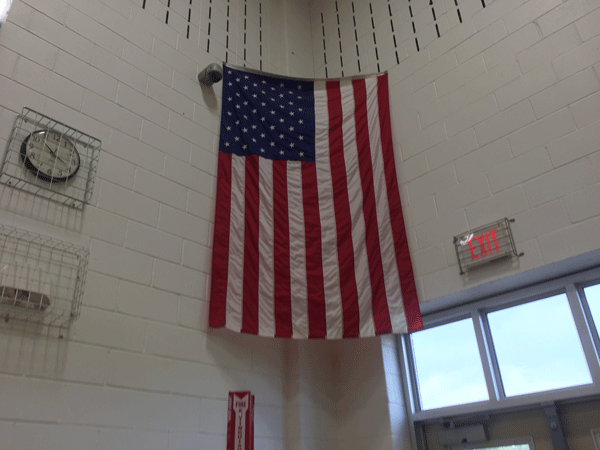
The American flag which hangs in the corner of Pascack Valley’s “new” gymnasium.
Editor’s Note: The opinions presented in this article are not necessarily that of The Smoke Signal or its staff. To be consistent with prior opinion articles, this disclaimer was added after the fact for both clarity and transparency.
I stand with Colin Kaepernick. I stand with Brandon Marshall. I stand with Jeremy Lane and Arian Foster and Martellus Bennett and all the others. We stand by sitting, kneeling, and raising our fists.
I stopped standing for the pledge in my sophomore year of high school in the wake of the death of Freddie Grey. When people ask, I say that I am sitting in protest. Recently, San Francisco 49er’s quarterback Colin Kaepernick has been in the news and has been heavily criticized for doing the same, albeit with the national anthem. His protest has caused a wave of other NFL players to follow suit, bringing national attention to something I have done for almost two years now.
For a long time, I thought nothing of the pledge. Every morning, kids have to stand, take off their hats, place their hands over their chests, and repeat the all too familiar phrases. It was ingrained from a very young age. It was just the thing to do.
Over the years, I’ve grown disenchanted with the state of our country, especially when it comes to the way it handles many social issues. I’ve learned things outside of school that have me questioning what I’ve learned in school. I read— really read—the pledge and realized what it actually said.
And I realized that the values it preaches are not the values that are reflected in our society. People may bash the internet, but it has given me this: the chance to form my own opinions based on a myriad of sources.
To clarify, I have a great respect for this country. I am not protesting the people who have died or survived—or who currently are—serving this country. I am not protesting the military. As Colin Kaepernick said, “They fight for liberty and justice, for everyone. That’s not happening. People are dying in vain because this country isn’t holding their end of the bargain up, as far as giving freedom and justice, liberty to everybody.”
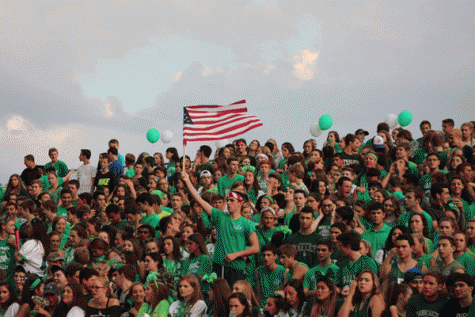
“I simply don’t have the undying, unwavering support for this country that some people seem to have.”
And, again to be clear, this is not to take away from this country or any of its accomplishments. I simply don’t have the undying, unwavering support for this country that some people seem to have. My respect comes with a healthy dose of criticism. I support this country, but at the same time, I criticize its actions heavily and wonder if it is taking the right steps to protect its citizens and grant equal rights to every resident, and I say that including people who are not citizens.
And in the aftermath of the deaths of Freddie Grey and Eric Garner and Michael Brown, I simply could not stomach the thought of standing in respect for a country that seems to not respect its citizens. I wanted systemic change and I still do. And that’s why I sit.
Sitting is my way of taking a stand for something that I feel is wrong. Yes, America is a better country than most on the planet and yes, my sitting for the pledge does nothing to solve the problems I have with this country. But my sitting is akin to my standing as an ally with those who are the mostly deeply affected by heavy injustices that minorities face in this country.
I sit because nothing has been done about police brutality towards black Americans. I sit because people are insisting on denying people access to bathrooms that correspond with their genders. I sit because the pledge includes the phrase “under God” and I am an atheist. I sit because there are still restrictions on gay men donating blood. I sit because the prison system disproportionately affects the poor. I sit because there are people in this country who do not have the “liberty and justice” that the pledge promises.
And I’m not the only student to have done this. There was a Supreme Court case in 1943, West Virginia State Board of Education v. Barnette, that established a student’s right to refuse to stand for the pledge.
So I support Colin Kaepernick in his choice to sit for the national anthem. I think he and all the others who have not stood for the pledge have a type of courage that I do not possess. They have used their platforms to stand for what they believe in and have exposed themselves to criticism nationwide. There are people who are calling for these men to be shot. I was reluctant to write this purely because of that backlash that I know it will cause. But what kind of protester would I be if I didn’t take the opportunity to speak out about an issue that is important to me?
You can feel however you want to feel, both about my actions and theirs, but I urge you to take a look around you, and notice the water that you have been swimming in all your life. Put yourself in the shoes of someone who has to fear walking down the street. Put yourself in the shoes of someone who is oppressed or bullied or ridiculed because of the color of their skin or the shape of their eyes. Ask yourself if you’re perfectly content with a country that allows, and in many cases legitimizes, prejudice.


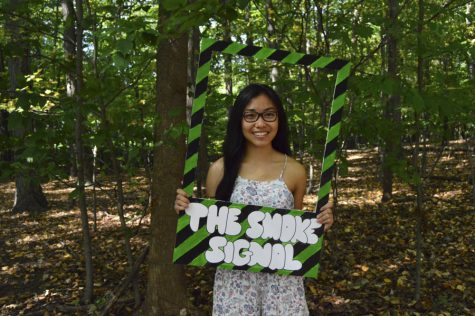
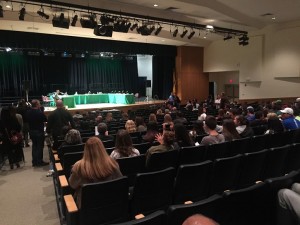






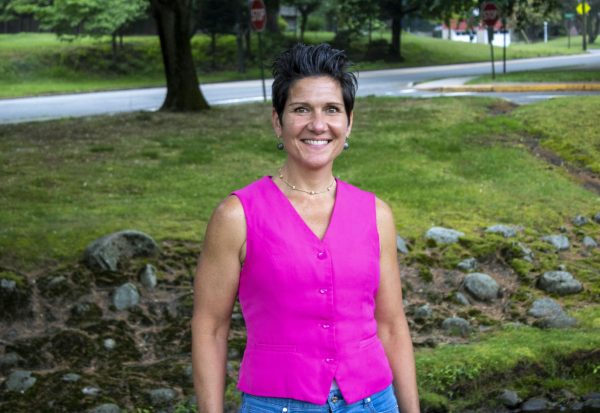
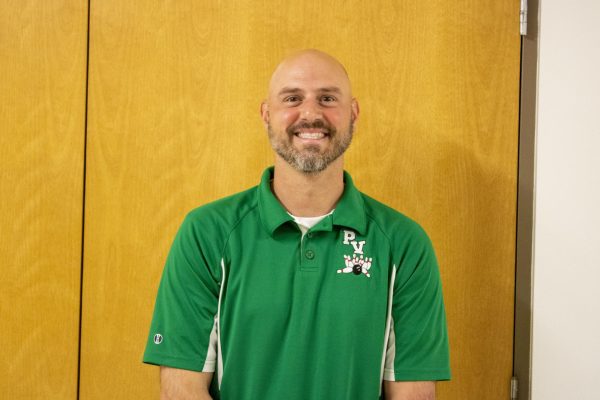
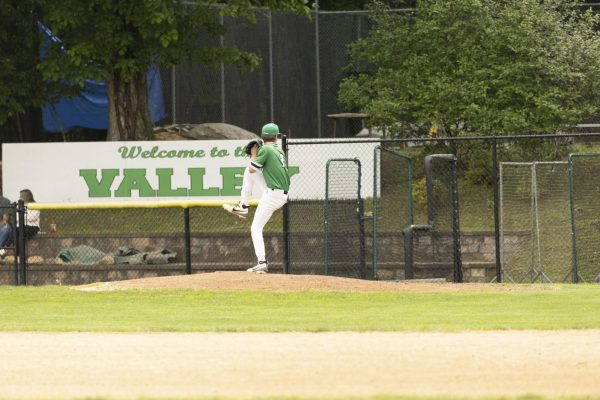

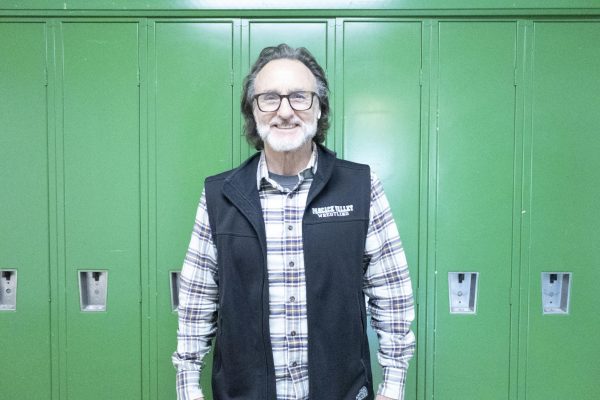
Joe Smith • Jun 28, 2020 at 1:32 pm
I really think you have missed the point of standing for the flag and saying the pledge.
We stand to honor those who died defending this country.
We stand so that you have the right to sit ( disrespectfully)
Just as no person is perfect, no country is but I am grateful my ancestors came to this country so that I can live in freedom.
That is why we stand also.
If you believe changes need to be made then work towards those changes . But showing disrespect doesn’t unite us.
If I was in another country and their anthem was played I would stand out of respect for them. I wouldn’t pledge but I would stand.
You say you respect this country but you don’t truly understand how lucky you are to be living here.
Caleb Burleson • Dec 20, 2019 at 11:41 am
I love grabbing my popcorn and reading the comments with all these tinybrains who worship a piece of cloth. Freedom of speech, baby. No need to stand up.
Sandra Carter • Oct 1, 2016 at 8:31 pm
You need to leave then. Enjoy another country.
Frank Cascio • Sep 28, 2016 at 9:24 am
Not standing for the flag is like going up to a mother of a fallen soldier and smacking her in the face. Although this may be a brutal image it is true. These soldiers laid down their lives so you could drive your fancy car, play the sport you love, and live the glorious life you live. As a country we need to stop having this five year old mentality of well he hit me first , so I can hit him back. There is no denying that this world is very corrupt and something needs to be done. However this does not mean you turn your back on the flag. Your simply not just turning your back on just the flag. You are turning your back on the soldiers, and their grieving families. So next time you think about not standing for the anthem, look down at your legs and arms because someone you don,t even know lost theirs for you.
Matt Kalil • Sep 19, 2016 at 2:34 pm
I don’t understand why people don’t stand for our national anthem. Soldiers have died for our freedom, soldiers have died for us to be a free country. No one is holding them back from leaving. Why be selfish and disrespect the soldiers who have died for our freedom?
Jennifer Peshansky • Sep 16, 2016 at 6:41 pm
I have not spoken the words of the Pledge for years now. I stopped somewhere in middle school. At first, I mouthed along, because I somehow thought I might get in trouble if someone noticed. Then I gave even that up and just stood there, hand over heart. The reason I stopped was because the words echoed empty. When I stood there, saying the pledge robotically, I realized one day that it simply meant nothing to me. I spoke the words because they had been driven into my brain since kindergarten, and perhaps because I was afraid of retribution. However, I had never truly thought about what they meant. The day I realized that, the day I realized I don’t really know what the pledge means, I stopped speaking mid-pledge. I realized that, if I truly wanted to figure out what it meant to say the pledge, and what it meant to love my country (already two separate things in my mind,) I needed to take some time to think.
Saying the pledge was not a moment where I ever, ever felt love for my country. It was an obligation. I’m fairly certain I learned the pledge before I even spoke English fluently. That is not to say I never loved America. I loved America when my grandparents spoke about their experiences immigrating here. I loved America when my great-grandmother described the sense of safety she felt here that she’d never felt back in the Soviet Union. I loved America when I saw people lifted up by the success of the American Dream. I loved America when I heard the national anthem and got chills down my spine at its beauty. I loved America when the flag waved above those it had lifted up. I loved America when the flag waved above the veterans who visited my elementary school. As a child, I looked up at them and shook their hands and thought of them as the bravest heroes I’ve ever seen. I still do. My life has always been filled with love for America, and I feel it during the moments when this country fulfills the promises of sanctuary, protection, and the American Dream to its people.
But that moment, when the announcements crackled and we all stood as one and turned robotically toward the flag and said the words that I never quite thought about the meaning of – that wasn’t a moment to love America. As a child, I didn’t even think about America during those moments. I thought about how annoyed I was that I had to stand up, that I had to say these words. I itched for it to be over so I could sit back down and go back to thinking about something that really mattered. Because, for me as a child, the pledge was not a time for thinking about America. It was a routine, and a boring one at that.
Which brings me to my main point – emotions are not clockwork. You cannot force someone to be infused with love for their country at a certain time every day, or following a certain cue. Perhaps some people take that moment to admire the flag and truly feel the love for America, but let’s be honest – every classroom in Pascack Valley High School has a flag. You can admire the flag and feel love for America at literally any point throughout the day. Expecting to just snap our fingers and feel love, and then go back to focusing on our schoolwork? Love doesn’t work that way. Neither does respect.
So should someone stand for the pledge and speak the words even if they do not believe them? Should someone stand up, in front of that great flag, and lie? That flag, which has been fought under for our freedom to express how we really feel – should we stand facing it and lie? I’m asking every single one of you who berated Jamie for not standing for the pledge. What do you want her to do? Do you think the soldiers who fought for the flag would want her to pretend everything is okay in this country? If she knows and feels that something is wrong, that we need to fix this country, do we want her to tell that flag that she loves it and that our country is perfect when we all, all know it is not? Do you think the soldiers fought for us to be silenced? Do you think the soldiers died for everyone to force their love for this country and ignore its flaws, rather than building a better country out of our love for it? You can’t change how people feel, and you can’t force them to feel love and respect for the country at the moment they say the pledge. And if they don’t, then what? Should they lie and pretend they do? Should they leave the country, every one of them, all those elementary school children still figuring out the meaning of some of the words, shifting antsily at this annoying obligation and waiting to sit back down? Should they all leave too?
I know that every single one of you who was in a rage about this article is probably not going to listen to me either. I’m terrified that everything I wrote is just preaching to the choir, that the only people who are going to read this and take this to heart are the ones that already understand these concepts. But I’m begging you to at least give me a chance here, because this great country was not built on lies, not denying the truth. So I ask you now – if somebody, child or adult, civilian or veteran, truly does not feel the emotions we’re “supposed” to feel during the Pledge, what, exactly, do you want them to do in that situation?
Drew Botwinick • Sep 15, 2016 at 3:30 pm
I respect your opinion on this issue but, I’m not sure how this affects you in any way. I honestly don’t think that it’s appropriate to be sitting during a salute to our great country. By sitting during the National Anthem will not help your cause in any way. If anything, it shows a lack of gratitude toward our country.
Josiah Stankus • Sep 14, 2016 at 11:42 pm
What does refusing the pledge of allegiance do for you? Sure, it gained the football players some press coverage, but what is it really doing? By refusing to pledge allegiance, and just sitting there, what exactly are you accomplishing? You are not advocating for change in the nation. You are just being upset. If you truly want a change, you use your rights, and organize or join a group who is for change. Don’t join or organize a group that sits down during the pledge, then just goes about their daily life, and somehow feels they have accomplished something. If you are doing nothing to help the nation, then you should start helping or stop protesting. The only point of sitting during the pledge is to gain attention, much like this article has. Do you somehow feel better, now that you have annoyed others and helped in no way whatsoever? I am not trying to generalize the anti-pledge people, because there are some protestors out there who are actually doing something to help the country. But sitting does not help.
Laura McDermott • Sep 14, 2016 at 12:42 pm
First and foremost I would like to state that I personally stand for the pledge as well as support it and the meaning behind it. However, I don’t understand some of the comments being made towards Jamie/this issue. Stating that somebody should leave this country because they don’t believe that what is CURRENTLY happening is right, makes no sense. Jamie clearly stated that this has nothing to with the history of this country. She word for word said “To clarify, I have a great respect for this country. I am not protesting the people who have died or survived—or who currently are—serving this country. I am not protesting the military.” Suggesting a 17 year old girl should uproot and move just because she doesn’t agree with some of the current social issues is a little ridiculous. I also do not believe that the solution to a problem should be to just tell people to leave the country if they don’t agree with what is going on. If there is a problem, we should strive to better ourselves as a nation, not dismiss the people who are standing against the current issues. And as far as saying all conservatives love America and all liberals hate it, that just isn’t something that one person can determine. Jamie was respectful in what she said and is allowed to have an opinion and should not be ridiculed for expressing it.
Matthew Mugno • Sep 14, 2016 at 4:04 pm
She may have been respectful in how she wrote it, but pledging allegiance to this country means you are one of its many members. It is slightly farfetched that Jaimie ” uproot” herself at a young age to go to another country, but there was no reason to post an article less than 24 hours after 9/11. The counter argument to this protest is not ” flawed”as many supporters of not standing for the pledge say. Again, you have the right to post this, but next time, the date should be taken into consideration. Just because it is a right of all of ours to have freedom of speech, does not mean it is taken extremely disrespectful to the rest of our society when we all stand for our country as this movement’s supporters sit in demur.
Joseph Kempka • Sep 14, 2016 at 9:42 am
Isn’t it kind of ignorant to use the freedom our country gives you to protest against its own pledge?
Gio Liguori • Sep 14, 2016 at 8:06 pm
Isn’t it kind of ignorant for everyone to be hating on this girl for exercising her freedoms?
Gio Liguori • Sep 14, 2016 at 8:11 pm
Isn’t it kind of ignorant for everyone to be hating on this girl for exercising her freedoms? If someone was to use their freedom of speech to say they disagreed with the Pledge, it wouldn’t create as much controversy as someone using their freedom of protest to sit during the pledge, even though they’re essentially doing the same thing. Sure, the way she’s going about it may not be the best way to use the right of protest, but she’s definitely allowed to.
Joseph Kempka • Sep 15, 2016 at 9:12 am
Protesting is not ignorant. But to tie in domestic issues like “racial inequality” with our Pledge is.
Andrew Kritzler • Sep 13, 2016 at 7:47 pm
Well said, Lucas+Lillian Ochoa; I’m glad sensible people like you exist. Jamie, the “police brutality towards black Americans” which you cited is misreported and blown out of proportion. Our country does NOT support prejudice, as you have said. There is no country in the world where people have more freedom or a better life than the United States of America. Conservatives, like myself, revere the Constitution and the inalienable rights that it provides to all citizens. Conservatives love this country, unlike the liberals who hate it. Let me remind you that liberals supported slavery and Jim Crow laws. Don’t insult America when you want to advance your false agenda.
Josiah Stankus • Sep 13, 2016 at 10:26 pm
I completely agree with Lillian, Lucas, and Andrew. If you feel something truly is wrong with the country, that is not the proper time to protest. Saluting the flag is not all about you and how you think the USA is treating you and others. It is a time for you to look at the flag and remember the struggles that men and women faced to get the 13 stripes and 50 starts on that flag, and to remember those who are still fighting today. If you really feel the need to protest, please do it at another time.
Sage Shapiro • Sep 14, 2016 at 10:54 am
“There is no country in the world where people have more freedom or a better life than the United States of America.”
Nope. In fact, there are 9 countries where the quality of life of the average citizen is higher than that of the average citizen in the US.
Source: http://www.numbeo.com/quality-of-life/rankings_by_country.jsp
Thanks for making this easy for me.
Michael Mugno • Sep 14, 2016 at 3:49 pm
That was rude.
And a “quality of life” index doesn’t mean there are more freedoms in that country. You can literally do almost anything you dream of in this country, provided it is lawful, including not standing for the Pledge.
David, Sean, Lilian, Lucas, Andrew, Josiah, and of course Matt, I completely stand by you guys, thanks for making your voices be heard. We, the rest of the school, never get the chance to say something to the sitters and their supporters because in this day and age, we would be called down to the office for hurting their feelings. This is more than PC, and I’ve had it.
Sage Shapiro • Sep 14, 2016 at 7:50 pm
Thank you for your reply.
If the article I referenced isn’t sufficient, here is another study that measures Personal and Economic freedom. The data is on page 20. As you can see, the United States ranks 20th in Freedom Index, which combines both Personal and Economic freedom into one number.
http://object.cato.org/sites/cato.org/files/human-freedom-index-files/human-freedom-index-2015.pdf
Matthew Mugno • Sep 14, 2016 at 3:56 pm
Then I suggest moving to those countries if you feel the United States is not one of the 9 countries that has to beckon to your needs. It’s simple. Love the country you are in. If you want to protest the flag, then help be a solution instead of stating all of “America’s Problems” and doing absolutely nothing to help solve it. Go into the neighborhood’s where people are in need, or go to a food pantry right in town. Instead of protesting and telling everyone else how you feel, go and be the solution, not a part of the problem. You are a problem after all, since the supporters of this ” movement” are not solving what they claim is the issue here. It would be easier to post something like this a week after 9/11 , instead of a day after such a tragedy, but that didn’t happen.
Sage Shapiro • Sep 14, 2016 at 8:32 pm
Thank you for your reply.
I understand your point, but I believe that those who love their country most would be the ones most eager to change their country for the better. If you truly love your country, you would do anything you can to fix its problems, right? Of course, the first step to changing something is to identify the problem. Right now, the problems that Jamie stated are racism and prejudice in the country. How would I, a 15 year old boy, do to solve that problem? I can’t legally drive or get a full time job, so my options are limited to doing what I can to raise awareness of this issue, and hopefully attract the attention of those in power. Until results are shown, I don’t understand why I’m “part of the problem”, because I’m trying to do something that I believe would make this country even better.
Nicole Beckemeyer • Sep 14, 2016 at 5:38 pm
This article that you’re referencing to “prove” that America is not the best country in the world is first of all based off of climate, health care costs, property taxes, and the traffic commute. These are all completely irrelevant when we’re talking about our freedoms we have as citizens. Also, a mid year poll from number.com does not prove to me that we do not live in the greatest country on earth. The way people feel about this country can’t be fact checked or proved incorrect by a poll.
Sage Shapiro • Sep 14, 2016 at 7:42 pm
Thank you for your reply.
If the article I referenced isn’t sufficient, here is another study that measures Personal and Economic freedom. The data is on page 20. As you can see, the United States ranks 20th in Freedom Index, which combines both Personal and Economic freedom into one number.
http://object.cato.org/sites/cato.org/files/human-freedom-index-files/human-freedom-index-2015.pdf
I would also like to see evidence that the US is the greatest country on Earth. I have no problem against having pride in your country, but I do have a problem with it if that claim isn’t backed by evidence.
Andrew Kritzler • Sep 14, 2016 at 9:58 pm
Sage, the study you pointed to had little relevance, for reasons above and below.
Firstly, I could easily establish why Jamie’s complaint of “police brutality, racism, discrimination, etc.” is incorrect. Doing so, however, would stray from the point of this article, which is whether or not it is acceptable to punish your country due to social issues. Yes, America is imperfect, but not for Jamie’s reasons. Your dissatisfaction with the condition of America is misdirected. What does disrespecting this country and the people who fought for its values accomplish? It briefly calls attention to whatever the cause may be, at the same time fracturing the nation and turning people against each other. In the long run, the issue is not more or less likely to be resolved. The answer to many problems was provided by the framers in the Constitution. Separation of powers allows the people to resist autocracy and for the governing to resist anarchism. James Madison said the following The Federalist 51:
“If men were angels, no government would be necessary. If angels were to govern men, neither external nor internal controls on government would be necessary. In framing a government which is to be administered by men over men, the great difficulty lies in this: you must first enable the government to control the governed; and in the next place oblige it to control itself. A dependence on the people is, no doubt, the primary control on the government; but experience has taught mankind the necessity of auxiliary precautions.”
We the people do have the ability to create change in our country. But we aren’t using those powers to their fullest. It will take a lot of work to untangle the bureaucracy that has been created (by liberals).
America’s incredible government design is the reason why people risk everything to come here. It’s why ordinary men enlist in the Armed forces to defend the greatest, and most sacred, country on Earth.
And thank you Mugno and all you patriots who defend their principles.
Sage Shapiro • Sep 13, 2016 at 5:09 pm
I respect everyone’s choice to stand or sit. I can’t truly control what anybody does except for myself. With that said, I believe that the argument of the side disagreeing with Jamie is somewhat flawed.
The argument I hear most commonly by those in disagreement of the article is that it’s disrespectful to the people who fought for our freedoms. Circular reasoning aside, if you look closely, you can see that there’s no argument at all. They fought for our freedom to protest, the freedom to be dissatisfied with the country. If anything, the people who fought for our freedoms should be happy we’re taking advantage of this right.
If you disagree with me, that’s fine. That’s your right. To be honest, from a personal standpoint, I don’t have strong feelings either way. I’m just saying, if you look at both arguments without any personal bias, one is more flawed than the other.
Julia Padovan • Sep 13, 2016 at 2:14 pm
Many of the comments are saying how it is disrespectful to not stand for the flag because the flag is a symbol of the people who fell for our country. That is a completely reasonable argument. If you as an individual are pledging because you interpret the flag as a symbol of fallen American soldiers, that’s okay. The respect we as Americans have for fallen soldiers is important, but we can show that respect in different ways. We can show it by getting chills when we hear the national anthem. We can show it by visiting a place like the Vietnam War museum. We can show it by studying our nation’s history and learning about the wars we fought and the freedoms we fought for. However, if someone personally interprets the flag as a symbol of our social and general freedoms, they should have the right to that interpretation. If they feel as if some people in our country’s social and general freedoms are not fulfilled, they have a right to that opinion. And in turn, they should have a right to sit for the pledge because their personal interpretation of the flag is not being fulfilled. The choice to not stand is not an act of disrespect. It in fact exercises the exact rights these veterans fought for. The respect that the average American citizen has for our fallen soldiers is non-perishable. The choice to not stand can never erase that respect or our patriotism.
Matthew Mugno • Sep 13, 2016 at 7:36 pm
I am unable to see your chills of patriotism as we stand for a pledge. The true question is, what is the point of this protest if you have patriotism for this country yet you just don’t want to stand for the pledge. That’s really similar to biting a hand feeding you a four course meal. It isn’t hard to stand for our country, that has kept all of us in quite good hands in our lifetime so far.
Douglas Rossig- Harrington • Sep 13, 2016 at 12:57 pm
My father served in the marine corps for 18 years and my mother served for 4. I understand why you feel the way you do about the flag. I DON’T think it has anything to do with the black lives matter movement. The flag symbolizes the patriotism people have towards this country, not the DOMESTIC issues our country is struggling with. If we pledge your allegiance, we want to stop the violence between civilians and police alike and come together as one nation.
Blair Abney • Sep 13, 2016 at 12:49 pm
I would like to respond generally to the comments here. If you believe that Jamie has the right to protest, then why do you take so much offense to her exercising that right? Also, Jamie stated in her article that she has nothing but respect for our veterans and soldiers, so why are you placing the opposite of that belief upon her? To use such a strawman argument to attempt to discredit Jamie’s point is disingenuous.
I stand (or perhaps sit is more appropriate) with Jamie. I do not stand for the pledge because I know that there is not “liberty and justice for all.” Perhaps you feel that there is liberty and justice for all, perhaps you think that I should just leave if I am dissatisfied with the state of my country, but I fully and respectfully disagree. Even a cursory look at the statistics surrounding who is the victim of violence (especially police violence) in this country shows that the people who are disproportionately affected are minorities. Lastly, if someone am dissatisfied with the state of their country (which I am), that doesn’t mean that they should leave. It means that they should exercise their American right of freedom of speech and speak up and speak out about our current societal ills. And that is exactly what Jamie has done and exactly what I strive to do.
Matthew Mugno • Sep 13, 2016 at 7:50 pm
If you don’t appreciate your country then why are the people against it still here. I’m not stating that you have to LOVE this country. At the same time, respect a country that has fought for your freedom to sit down as we honor everyone who make this country a prosperous and free land. Immigrants leave their country to come to the United States of America for a better life. There is no other country in the world that allows you to disrespect your country by sitting down during the pledge of allegiance. and national anthem.
Lucas Ochoa • Sep 13, 2016 at 11:53 pm
Just because you say you respect our Veterans doesn’t mean you do cause both your actions clearly disrespect the Men and Women who have come home in boxes, with the flag that you openly disrespect, draped over them. There other forms of protest that you can use to fight against…. “injustice” ….?…If you hate injustice so much you join the Military and maybe you can actually do something about injustice in places where it actually is thing.
Aria Sen • Sep 13, 2016 at 12:44 pm
My understanding of what the flag represents could be completely different from someone else’s, but it’s important to remember that, to each his own.
And is not standing for the anthem or pledge really that disrespectful? I see it as more of a refusal to go against someone’s beliefs. Standing up for what you believe in and following through in a nonviolent fashion is not something that’s new to the national forum- in fact, it’s an action that has produced historically significant results.
We need to understand Jamie’s actual point. She’s speaking strictly towards domestic affairs, not anything that is even remotely international.
There will always be a disagreement between the right and left- and that’s what makes up the base of politics in our country. You can’t superficially concede to Jamie’s argument just to explain all the reasons you think she’s still wrong. The flag represents a multitude of things, but at the end of the day it represents a history, a country, and its ideals.
Jeremy Gunther • Sep 13, 2016 at 10:10 am
I don’t understand why you’re using the picture from Friday’s Valley game in your article. We all stand for our anthem, and never take our freedom for granted. Nobody in this photo supports your political aim. I respect your right to free speech, but men and women of this country lost their lives for this country, and it’s time you show some appreciation and respect. If you don’t like it, then leave.
Luke Rowe • Sep 13, 2016 at 8:42 am
The “under god” part of the Pledge represents that our country was built on religious freedom. No matter what religion you belong to, you can still reside here without persecution. Even if you don’t belong to any religion, you can still reside here.
Nick Cascio • Sep 12, 2016 at 8:18 pm
Before you sit down for the pledge think about the men and women who died so that you can say the pledge, think about the soldier that lost their legs and would do anything to stand. Open up your Liberal Left mind and wake up.
Aidan Soldiviero • Sep 19, 2016 at 1:57 pm
I agree with you Nick. The people that don’t stand for the pledge are lucky to be able to do that. I can understand that they are protesting, but they should protest in a different matter.
Matthew Mugno • Sep 12, 2016 at 6:04 pm
Truly sad that this was posted the day after 9/11. You are allowed to have your opinion, but I don’t understand why this article needs to be on the front page. We should have a tribute to the first responders as the main article. Not an opinion article. To add, the government is doing a fine job respecting its citizens . These players , Arian Foster ,Colin Kaepernick, and Jeremy Lane , are also being paid 5 million dollars to catch a ball. We keep hearing about these protests of yours, and this takes it too far.
Lucas Ochoa • Sep 12, 2016 at 11:50 am
Men and women dedicate their lives to this country. Men and women died to protect your right to sit down. If you have such a problem with this country you have your right to leave.
Lillian Ochoa • Sep 12, 2016 at 11:18 am
Where I appreciate and definitely acknowledge your freedom to not stand for the pledge, I also acknowledge that people died to FIGHT for your freedom to sit during the pledge. People gave up their lives, their families, to go and fight and dedicate their life to that flag. Being Patriotic has nothing to do with supporting “social injustices” or any of that, it purely means having a strong love for your country and respecting those who are serving to keep us safe. Being Patriotic means loving the history of our country, loving the people who created the United States of America… Freedom of speech is something you have, yes, but that freedom didn’t come free. Respect those who died for that flag, and next time you want to sit for the National Anthem think about the millions that gave everything for it.
Sean Tocci • Sep 12, 2016 at 11:02 am
I understand completely your right to sit in protest. I will never argue that you should not do that because you are simply exercising your rights. I am a very patriotic person so let me try to explain my point of view. When I think of the flag I believe that the flag represents the people of our country and the men and women who have so bravely fought to protect it. I DO NOT believe that it represents corrupt politicians, governments decisions on social issues, and police brutality. I believe that the national anthem represents the core American values which are things like freedom and liberty. So when people disrespect the flag and things like the national anthem because I do not feel that the flag represents social injustices or ignorance but rather the great spirit of America and everything that America was founded upon. The flag represents the freedoms that you as an American possess and it should be used as a symbol for the people rather than a symbol to which hate can be directed towards.
Robert Arloro • Sep 14, 2016 at 9:50 am
Great comment Sean! I completely agree with your point and you articulated it smoothly without passing judgement. Thank-you for expressing how many of us feel.
David Forcellati • Sep 12, 2016 at 10:49 am
Way to choose examples of “police brutality” where the black male who was killed was the offender and the cop was innocent. Really top notch there. Posting this argument so close to 9/11 is also distasteful.
Mrs. Recine • Sep 12, 2016 at 10:18 am
You articulated your beliefs beautifully and thoughtfully. Sometimes people are quick to judge controversial decisions and certain forms of protest, forgetting about our right to free speech and expression. Nice job!